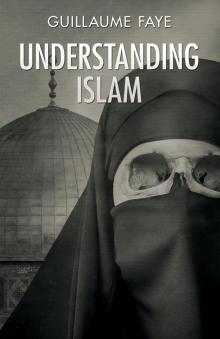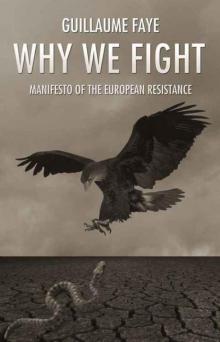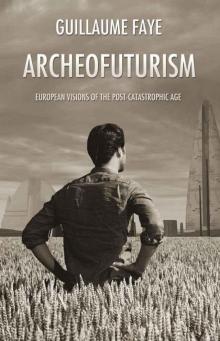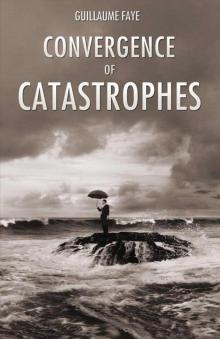Understanding islam, p.1
Understanding Islam, page 1





Guillaume Faye
Understanding Islam
London
Arktos
2017
Copyright © 2017 by Arktos Media Ltd.
Follow us: Website | Facebook | Twitter | Instagram
All rights reserved. No part of this book may be reproduced or utilised in any form or by any means (whether electronic or mechanical), including photocopying, recording or by any information storage and retrieval system, without permission in writing from the publisher.
ISBN
978-1-910524-83-1 (Softcover)
978-1-912079-00-1 (Hardback)
978-1-912079-72-8 (Ebook)
Translation
Roger Adwan
Editing
Martin Locker
Proofreader
Daniel Friberg
Cover design
Andreas Nilsson
Layout
Tor Westman
ARKTOS MEDIA LTD.
Introduction: A Radical, Archaic Novelty
Understanding Islam means identifying its double rationale, its twofold, age-old DNA: totalitarianism and jihad, paired with a belligerent conquest devoid of geographical restrictions, always accomplished through cunning or violence. To understand Islam is to become aware of the fact that, despite its deadly internecine divisions, it targets a common enemy: our own civilisation, as well as all other ones. Understanding Islam means grasping that the sole difference between Islam and Islamism lies in their respective tactics. To understand Islam is to ponder its propensity to confuse faith with lawfulness, temporality with spirituality and religion with politics. Understanding Islam means conceding that, due to its very essence, it is absolutely incompatible with pluralist democracy, secularism and freedom. Its cause is one of theocracy and its reign synonymous with the decline of intelligence and the waning of free inquiry.
To understand Islam is to look upon ‘secular Islam’ or ‘Islamic enlightenment’ as mere utopias. Its Western collaborators are in a state of submission, remaining frightened and blinded while simultaneously contradicting their own principles in a fit of schizophrenia. Understanding Islam means exposing its blurred convergences with Fascism, Nazism, Marxist Communism and anti-Semitism. To understand Islam is to assess how much it relies on a settlement process through immigration and on swift and uncontrolled mass colonisation.
To understand Islam is to perceive that it has no metaphysical aspect to speak of, lacks any theological dimension and is bereft of any and all philosophy. Instead, it depends on the dogmatic binomial of superstition and ideology. In addition, our understanding of Islam leads us to ponder the duality between obscurantism and reason, as well as that between submission and freedom.
To understand Islam is to acknowledge, from a historical perspective, its power to stun and conquer, a power as archeofuturistic as it is proactive and currently reemerging from the centuries of old. Understanding Islam means refusing to submit to its values or to accept its principles. However, this does not imply that we are to despise it, as it is not subject to contempt, but emphasises the necessity to familiarise ourselves with it in order to prevent the Islamisation of Europe, a process that would lead to both catastrophe and decadence.
Understanding Islam also leads us to question why European leaders are afraid of it, giving in to a syndrome of cowardice and fearing a power that they eventually collaborate with in accordance with an old historical logic, as confirmed by the prosecutions conducted against ‘Islamophobia’, the new capital sin, and by the incredible privileges that Islam benefits from in a Republic that practices a secularism with a variable geometry.
One is also left wondering why, despite the recurrent anti-Christian persecutions in the East, the Catholic prelates and the Vatican hierarchy of the Church bow their heads before Islam’s all-conquering will. Furthermore, one puzzles over the reason why the majority of all acts of terrorism, bloody turmoil and geopolitical destabilisation committed all over the world use Islam as a justification and revolve around the latter. Understanding Islam implies a reticence to abide by its values, endure its principles and coexist with it on our soil, simply because any cohabitation with Islam has always given rise to civil war.
Islam has never honoured a single truce nor respected a single pact. Defending oneself against it is considered a ‘stigma’, an act of aggression. It is this very same Islam, which constantly presents itself as a victim, that is responsible for practicing an aggressive jihad and demanding privileges.
Last but not least, understanding Islam means returning to the central issue: that of the (possibly slow yet steady) onset of war and the designation of the enemy. Carl Schmitt once taught that even if you refuse to have enemies as a result of being pacifistic, it is to no avail, since others will still identify you as their foe and you will find yourself unable to escape war, suffering attacks regardless of your own actions.
Islam is to be taken very seriously, much more so than by today’s Islamophiles. The latter misunderstand it and consider it to be a ‘religion like any other’, which has never been the case and never will be. This criticism of Islam does not stem from a Judeo-Christian perspective nor that of any other religion, nor is it due to an atheistic mental position or one’s ideological belonging. My reflection is a personal one, the only difference being that I am inspired by the principles of Aristotelian thought, namely experience, common sense and balance.
The author thus presents things from an Aristotelian perspective.
Guillaume Faye, who has authored numerous books, is the man behind the gfaye.com blog, a blog otherwise entitled ‘Making Sense Of It All’. A lecturer in the EU, Russia and North America, Faye is considered to be a dissident theorist of the ‘New Right’.
Chapter I: The Historic Nature of Islam: The Invention of Totalitarianism
From the death of Muhammad in 632 CE in Medina to the time when Charles Martel stopped the callous Muslim-Arab conquest in its tracks at Poitiers in 732 CE, the Muslims managed to take over all of Arabia, the Middle-East, Egypt, North Africa and Spain in the space of a single century, beginning in the small area of the Arabian Peninsula known as the Hejaz. In the process, they brought the Persian Empire to its knees, amputated the Byzantine Empire and erased the Visigothic kingdoms. Seldom in our entire human history has anyone seen a single people, the Arabs, conduct such a hostile conquest and thus claim such immense territories. The power of Islam accounts for this victory, especially when considering the fact that the vanquished nations often converted to the Muslim religion. In the eyes of all fundamentalist Muslims, this historic episode is a foundational miracle which has but one significance: that Allah is the one true God who grants his believers supremacy.
Later on, things were to become complicated, with the emergence of schisms and power rivalries within this all-conquering Islam. Over the centuries, periods of conquest and domination, stretching the Muslim rule all the way to Asia through highly brutal and glorious means, gave way to humiliating setbacks. The European colonialism that characterised the 19th and 20th centuries was to have the worst impact of all, far more so, in fact, than the Crusades themselves, not to mention the dismemberment of the Ottoman Empire and, at a later point, the creation of the State of Israel.
However, already in the 1920s, Islam was plotting its revenge and retaliation with the creation of the Muslim Brotherhood in Egypt. Oil revenue, demographic growth, the birth of the Shiite Islamic Republic of Iran and the Muslim migration with its flooding of Europe would come together to mix the necessary ingredients for an overwhelming renewal of the age-old Islamic aggression. The complexity in which this recommencement is shrouded should not be allowed to conceal the truth: that of an ongoing Muslim offensive.
What we are witnessing is the opening of a new chapter in the novel of human history, a chapter once thought to have ended with the Spanish Reconquista, European colonialism, the fall of the Ottoman Empire and the gradual domination of the West under American guardianship. Islam, once believed to be dead and buried, has resuscitated, its archaic power still intact. There are several new developments nowadays: the Muslims’ return to their roots (Islamism), their demographic dynamism and the powerlessness of European leaders in the face of immigration, all placing Islam at the core of history. The latter, it seems, is more cyclical than linear…
The Oracle Muhammad and His Uniqueness
Islam was born during the 7th century among the Arab Bedouin tribes, thanks to a warlord named Mohammed, a man of ingenuity or, at the very least, one whose personality was superior to that of others. He claimed to be a prophet, a messenger of God. In truth, it would be more becoming to speak of the oracle Mohammed, since he never actually ‘prophesied’ anything, restricting his role to the transmission of God’s words and laws (or so he claimed). All of this is reminiscent of the Pythia, the Oracle of Delphi, who conveyed Apollo’s wishes and predictions to the people. Many see in Mohammed an affinity with Jesus Christ, who declared himself to be the actual Son of God, the Messiah whose advent had been foretold by Jewish prophecies and who had been sent to Earth by God himself, partaking in the Trinitarian Godhead and embodying God Himself in a man born of a virgin.
Never have Judaism and Islam dared venture that far. Just like the oracle Muhammad, all the Jewish prophets since the days of Moses have always presented themselves as mere mortals whose inspiration comes from God. Jesus, on the other hand, is consubstantialis patri (consubstantial with God the Father) and immortal, having risen from the dead after his crucifixion.
Obviously, when looking at things from a pagan point of view (that of the polytheism that typified Antiquity in ancient Rome, Greece and the East, or that of the modern form of Hindu polytheism) and an agnostic standpoint (Aristotelianism and all hermeneutical philosophies), one cannot help being critical and feeling concerned that men would declare themselves to be chosen and claim to reveal God’s truth and will. The three revealed monotheistic religions are thus all tarred with the same brush and subject to the same rejection of dangerous dogmatism. Nevertheless, as we shall soon see, the differences between the first two monotheistic religions (i.e. Judaism and its self-declared successor, Christianity) and Islam are huge.
Admittedly, unlike pagan polytheism (a system devoid of Revelation, based on mythology and particularly dependent on ritualised superstitions), the above-mentioned monotheistic religions are all rooted in sacred scriptures which establish fixed dogmatic rules that appeal to people’s faith and require a mental engagement that is totally alien to both paganism and philosophical agnosticism. However, this is where their similarity ends. For the particularity of the Islamic religion, whose tenets were officially inscribed in the Koran through Muhammad the oracle, is that it separates itself radically from the Judeo-Christian doublet through its extraordinary rigidity, a rigidity that is absent among Jews and Christians. Indeed, Islam has adopted several misdirected imitations of various Judeo-Christian elements, including them in its Koran, watering them down and transforming their very meaning. Unlike Jewish and Christian texts, which require interpretation, the Koran is seen as the direct word of God (Allah), whispered in the ear of Muhammad the oracle. The incontestability and immutability of the text are therefore absolute. One may well object that in the New Testament, the words of Jesus (who is considered the Son of God and God Himself) establish absolutes that are just as rigid as those revealed by Allah to the oracle Muhammad. True enough, but there is a difference: Christ speaks in parables, which are always open to interpretation and discourse, whereas the Koran is a series of statements and rules, supposedly of divine origin, that are incontrovertible and authoritarian, tolerating neither objection nor criticism. And therein lie Islam’s totalitarian roots.
Resultantly, the power of Islam is due to its dogmatic simplicity. The oracle Muhammad has spoken, so there is nothing more to think about nor comment on: one is simply required to obey. The power of Islam is indisputable, yet it lacks any philosophical ingenuity whatsoever. Islam targets simple-minded people while simultaneously simplifying their spirits further, at the risk of rendering them childlike and flushing out every trace of critical spirit. Moreover, unlike the message of Christ, who preached harmony, the commandments of Allah reported by his oracle and organised into Suras contain an implied intolerance, fraught with numerous appeals to murder and constant references to punishment should one fail to submit. Hence a fact that we will return to later, namely that Islam is, by nature, fundamentally anti-Jewish and anti-Christian (in its sacred texts), but equally ruthless towards anything and everything that conflicts with it. By contrast, Judaism and Christianity are not anti-Muslim in any way, and neither are the other faiths or philosophies embraced by the rest of mankind.
It should also be noted that, as a result of the absoluteness of Muhammad’s decrees, both traditional Muslim countries and those conquered by Islam experience less wellbeing, prosperity and peace than anyone else, a fact that applies as much today as it did in the past. They wallow in disorder, poverty and war (the only exception being the oil monarchies of the Gulf, which act as temporary bunkers). In anticipation of Allah’s post mortem Paradise, the general rule is that all zones which fall under Muslim dominion are plagued by internal chaos or permanent tensions and that Islam is in itself a source of threats and confrontation, wherever it becomes established. Why is that, I wonder...
Muhammad — a Manipulative and Ingenious Dictator?
Unlike ordinary people who display sufficient common sense to view Islam as an aggressive, conquering and intolerant religion, the European elites regurgitate, for reasons of hypocritical political calculation, that Islam is a peaceful religion resembling Christianity. They know very little about the subject. Christianity itself has not always been a religion of peace, far from it actually, but Islam is even less so.2 For if the internal and external wars waged in the name of Christianity were conducted in spite of Christ’s words, the wars and acts of violence carried out in the name of Islam have been in agreement with the words and deeds of the oracle Muhammad.
The founder of Islam, Muhammad, was by no means a bleeding heart. This young, illiterate camel driver from Mecca married his mistress, Khadija, a rich merchant who was fifteen years his senior. This situation of economic comfort allowed him to meditate in the desert, where he claimed to have met the Archangel Djibril (Gabriel), the one who transmitted the word of God (i.e. the Koran / Koran) directly to him. At this point already, there are several strange things to be noted. First of all, this constitutes a deviation from strict monotheism (whose only examples are the solar forms of paganism), since this archangel is indeed a supernatural being, a demigod as pagans say. What an embarrassing contradiction. On the other hand, the Archangel Gabriel, a being inspired directly from the Jewish Bible (and, in all likelihood, from pre-Islamic Arab polytheism as well), is the very same one who, in the Christian narrative, announces to the Virgin Mary that she will conceive the child Jesus. This explains the fact that the Muslim tradition claims to be the successor of Judaism and Christianity, one that amends them both. For Muslim theologians, Christianity was mistaken in its belief that the Archangel Gabriel had announced the birth of the Son of God, when, in actual fact, he had merely proclaimed the coming of a prophet, Christ, whose role was as temporary as that of all Judaic prophets and whose words were to be replaced by the teachings of the ultimate true prophet (or oracle), namely Muhammad.
As the sole authentic custodian of the divine word through the intercession of the Archangel, Muhammad begins to preach a new religion. This is ‘Islam’, meaning submission (to God, of course, but also to Muhammad himself, who claims to be God’s messenger and spokesman). His orations achieve some success among the poor and destitute, but are rejected by Arab dignitaries as cock-and-bull stories. When Khadija dies, he is expelled from Mecca and departs in order to take refuge in Medina, accompanied by his followers. This marks the beginning of the Hegira, i.e. the start of the Muslim calendar count. In Medina, Muhammad sets out to conspire between rival clans, imposing himself first as an intermediary and referee and then as a leader thanks to his powerful personality and charisma. He becomes the ringleader of a gang that indulges in raids and the looting of caravans, while still continuing to preach. He murders his opponents, those who criticise him openly and the ones that are too moderate, using ruse (taqiya, a fundamental notion that is revered and considered positive in Islam) and breaching every single truce he signs.
Furthermore, he does not hesitate to award himself several women (including Aisha, then 6 years old and deflowered at the age of 9), in addition to concubines and slaves. He justifies his outrageous behaviour through various verses of the Koran that he recites continually and in a most timely manner, verses that represent the indisputable words of God revealed exclusively to him by the Archangel during his stay in the desert. Muhammad then attempts to rally neighbouring Jewish tribes behind his politico-religious cause. All in vain: they refuse. He therefore proceeds to exterminate them. Then, after successfully conquering Mecca (where he was once persecuted) and exhorting his faithful fanatics to attack surrounding nations and the rest of the world, he dies unexpectedly, without having appointed a successor (i.e. a new politico-religious war chief). A political crisis thus erupts between two factions: the Sunnis (the companions of Muhammad, claiming to have the right to succeed him) and the Shiites (those who sided with his cousin and son-in-law Ali and supported him). A deadly conflict ensues. Despite these hostilities, a common foundation subsists: the Koran. That is to say, the teachings and divine directives supposedly received by Muhammad, whose sacred authority neither of the two hostile camps questions.



















